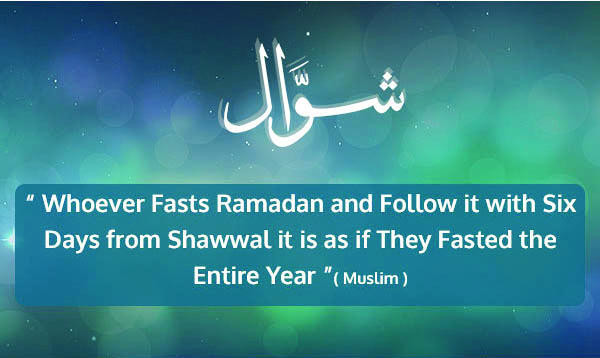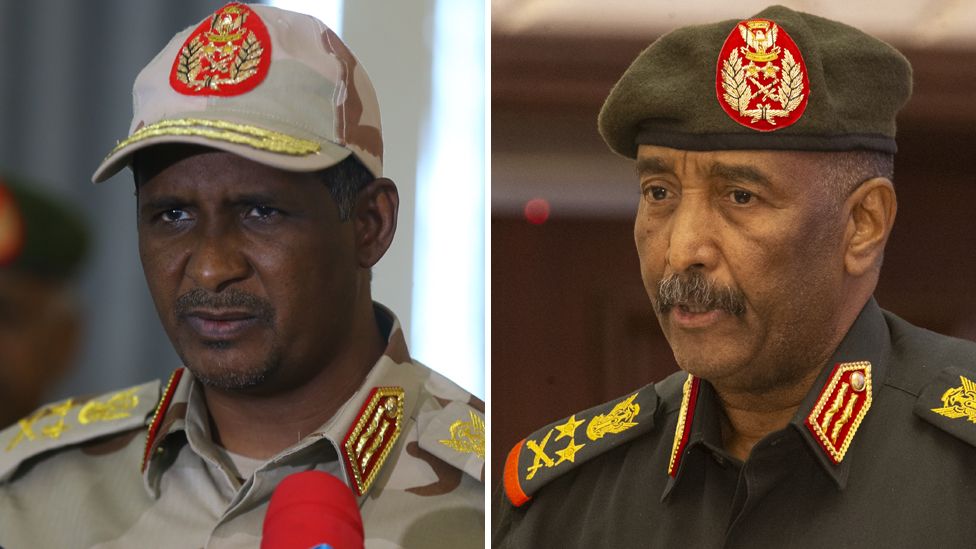Abu Ayyub Al-Ansari relates that Allah’s Messenger (peace be upon him) says: “Whoever fasts the month of Ramadan and then follows it with six days of fasting in the month of Shawwal, it will be as if he had fasted the year through”, (Sahih Muslim, 1163).
The month of Shawwal is singled out for the observance of extra fasts since this month follows immediately after Ramadan. The six days of voluntary fasting are the obligatory fast of Ramadan what the Sunnah prayers are to the obligatory prayers.
Thawban reported that the Prophet (peace be upon him) said: “The fast of Ramadan is like observing 10 months of fasting. Fasting six days of Shawwal is like observing two months of fasting. This together is like fasting throughout the year”, (Sahih Ibn Khuzaymah, Sunan Al-Nasai Al-Kubra; authenticated by Al-Albani).
Al-Nawawi says: “Scholars have explained that it is like observing a year of fasting because the reward of one’s good deeds is multiplied 10-fold. Therefore, fasting during the month of Ramadan is like fasting for 10 months and fasting six days in the month of Shawwal is like fasting for two months”, (Sahih Muslim).
Among the virtues of fasting six days include Fasting 6 days in Shawwal after Ramadan gives the person the reward of fasting throughout the year and the fasts of Sha’ban and Shawwal are like the Sunnah prayers that accompany the five obligatory prayers. Like the Sunnah prayers, these extra fasts cover up for the deficiencies in our performance of our obligatory worship. On the Day of Judgement, our voluntary acts of worship will compensate for the shortcomings in how we carried out our duties. Most of us have deficiencies in our observance of our Ramadan fasts and we need something to cover up for those deficiencies.
Our return to the habit of fasting right after Ramadan is a sign that our Ramadan fasts were accepted. When Allah accepts our worship, He blesses us to engage in further acts of piety. The saying goes: The reward of virtue is further virtue. Therefore, following one good deed with others like it is a sign that the first deed had been accepted by Allah. By contrast, if a person’s good deed is followed by a sinful one, it is an indication that the first good deed might not have been accepted.
Those who observe the fast of Ramadan are given their recompense for the day of Eid El Fitr, the day when the fast is rewarded. Getting into the habit of fasting again soon thereafter is a means of giving thanks to Allah for the blessings that we have received. There is no blessing greater than forgiveness for one’s sins, and we know that the fast of Ramadan is recompensed with forgiveness of one’s previous sins.
Indeed, Allah has commanded us to give thanks for the blessings of the Ramadan fast and to do so by making mention of Him and through other means of giving thanks. Allah says: “(He wants you) to complete the number of days, and to glorify Him in that He has guided you; and perchance you may give thanks”, (Qur’an, 2:185).
It is known that some of the pious predecessors would try to get up at night to pray the Tahajjud prayer. When Allah blessed them to wake up and do so, they would fast the next day in thanks to Allah for blessing them to observe that prayer.
Every blessing that Allah gives us is something that we have to be thankful for. Moreover, when Allah blesses us to show thanks, this is a further blessing from Allah that deserves further thanks from us. If we show further thanks, this in turn is another blessing deserving our gratitude. There is no end to this and we can never be thankful enough. When we recognise that our thanks are never enough, this is the highest expression of gratitude we can give.
Al-Shafii, Ahmad bin Hanbal and Ishaq Al-Rahawayh hold that is preferable and recommended to fast six days in the month of Shawwal. This opinion has also been related by Ibn Abbas, Kab Al-Ahbar, Tawus, Al-Shabi, Maymun bin Mahran, and Ibn Al-Mubarak. They base their opinion upon the Hadith that we have discussed above.
Others have regarded fasting six days in the month of Shawwal to be something disliked. This view has been related to Malik and Abu Hanifah. They argue that it is feared by the general public that they might misconstrue fasting these six days to be something obligatory. They also see it as emulating the People of the Scripture to exceed the number of fasting days in the prescribed month of fasting.
However, these objections are spurious in the face of the clear statements of the Prophet (peace be upon him) that encourage this fast. If we were to abandon a Sunnah act on the grounds that we are exceeding what is obligatory, then we would have to abandon all recommended fasts, including the fast of Ashura and the fast of the middle of the month.
It has been related that Malik used to personally fast for six days in Shawwal. Also, later Hanafi scholars decided that there is no objection to fasting these days.
The Maliki jurist Ibn Abd Al-Bar explains (Al-Istidhkar, 3:380): Malik did not know of the Hadith related by Abu Ayyub Al-Ansari, even though it is a Hadith from the people of Madinah. No one possesses all the knowledge held by others. Malik explained and clarified what he disliked about it. He was afraid that it would be added to the obligatory fast of Ramadan by the general public. Malik was extremely cautious when it came to matters of religion.
As for fasting six days in the month of Shawwal to seek extra blessings, as Thawban depicts it, this is something that Malik had no objection against — and Allah knows best — since fasting is a person’s protective shield and its virtues are well-known. When we give up our food and drink for Allah’s sake, it is a virtuous and good deed. Allah says: “O you who believe, bow down in Ruku and bow down in Sajdah, and worship your Lord and do good deeds so that you achieve success”, (Qur’an, 22:77).
There are various opinions about how to observe the fasts in Shawwal; Some scholars hold the view that it is preferable to fast the six days in consecutive order, starting from the second day of Shawwal. This is the view of Al-Shafii and Ibn Al-Mubarak. Others are of the opinion that it is preferable to fast the six days intermittently, spreading them out throughout the month of Shawwal. This is the position of Ahmad bin Hanbal and Waki.
Then there are those who hold the view that the days should all be postponed until later in the month and not close to the day of Eid, which is a time of celebration and feasting. They prefer fasting the three days in the middle of the month (Ayyam Al-Bid) along with the three days right before or after. This is the opinion of Mamar and Abd al-Razzaq. There is considerable flexibility in all of this. We can choose to follow any of these approaches that we wish.
Byy Adémólá Òrúnbon, an opinion writer, poet, journalist and public affairs analyst, writes in from 17, Ajanasi Street, off Ajagannabe Road, Oke-Posu, Epe, Lagos State.
Can be reached via: orunbonibrahimademola@gmail.com, or 08034493944, 08029301122.




